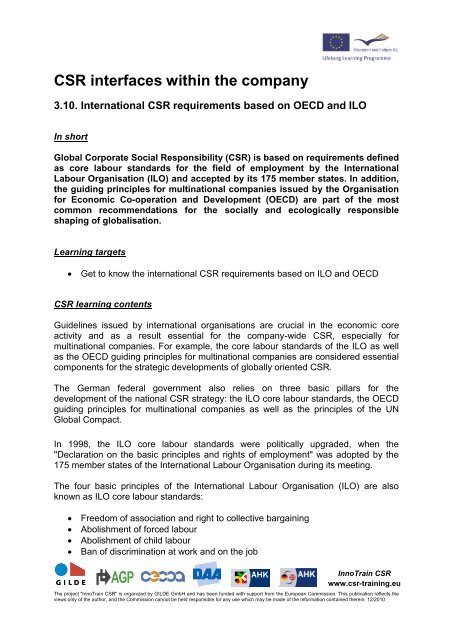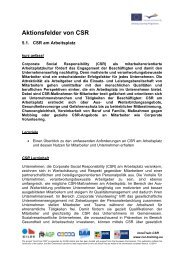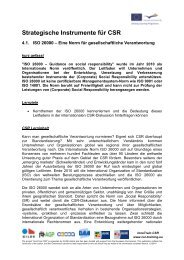What is Corporate Social Responsibility? - InnoTrain CSR
What is Corporate Social Responsibility? - InnoTrain CSR
What is Corporate Social Responsibility? - InnoTrain CSR
Create successful ePaper yourself
Turn your PDF publications into a flip-book with our unique Google optimized e-Paper software.
<strong>CSR</strong> interfaces within the company<br />
3.10. International <strong>CSR</strong> requirements based on OECD and ILO<br />
In short<br />
Global <strong>Corporate</strong> <strong>Social</strong> <strong>Responsibility</strong> (<strong>CSR</strong>) <strong>is</strong> based on requirements defined<br />
as core labour standards for the field of employment by the International<br />
Labour Organ<strong>is</strong>ation (ILO) and accepted by its 175 member states. In addition,<br />
the guiding principles for multinational companies <strong>is</strong>sued by the Organ<strong>is</strong>ation<br />
for Economic Co-operation and Development (OECD) are part of the most<br />
common recommendations for the socially and ecologically responsible<br />
shaping of global<strong>is</strong>ation.<br />
Learning targets<br />
� Get to know the international <strong>CSR</strong> requirements based on ILO and OECD<br />
<strong>CSR</strong> learning contents<br />
Guidelines <strong>is</strong>sued by international organ<strong>is</strong>ations are crucial in the economic core<br />
activity and as a result essential for the company-wide <strong>CSR</strong>, especially for<br />
multinational companies. For example, the core labour standards of the ILO as well<br />
as the OECD guiding principles for multinational companies are considered essential<br />
components for the strategic developments of globally oriented <strong>CSR</strong>.<br />
The German federal government also relies on three basic pillars for the<br />
development of the national <strong>CSR</strong> strategy: the ILO core labour standards, the OECD<br />
guiding principles for multinational companies as well as the principles of the UN<br />
Global Compact.<br />
In 1998, the ILO core labour standards were politically upgraded, when the<br />
"Declaration on the basic principles and rights of employment" was adopted by the<br />
175 member states of the International Labour Organ<strong>is</strong>ation during its meeting.<br />
The four basic principles of the International Labour Organ<strong>is</strong>ation (ILO) are also<br />
known as ILO core labour standards:<br />
� Freedom of association and right to collective bargaining<br />
� Abol<strong>is</strong>hment of forced labour<br />
� Abol<strong>is</strong>hment of child labour<br />
� Ban of d<strong>is</strong>crimination at work and on the job<br />
The project "<strong>InnoTrain</strong> <strong>CSR</strong>" <strong>is</strong> organized by GILDE GmbH and has been funded with support from the European Comm<strong>is</strong>sion. Th<strong>is</strong> publication reflects the<br />
views only of the author, and the Comm<strong>is</strong>sion cannot be held responsible for any use which may be made of the information contained therein. 12/2010<br />
,<br />
<strong>InnoTrain</strong> <strong>CSR</strong><br />
www.csr-training.eu





